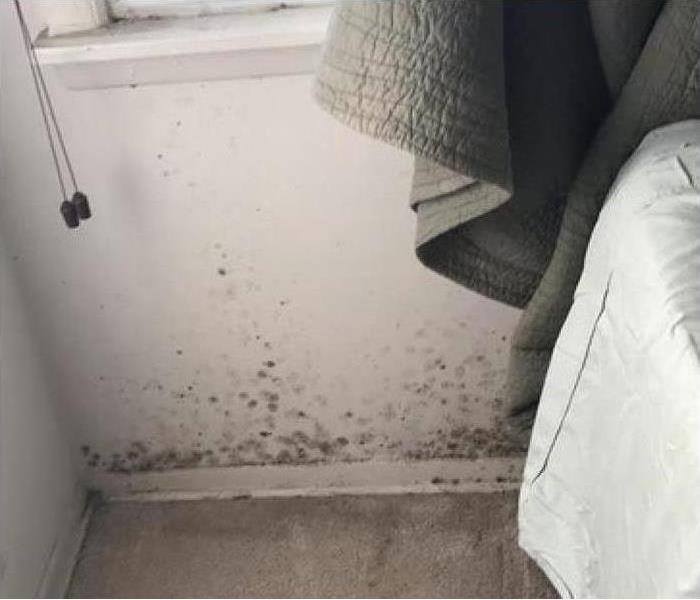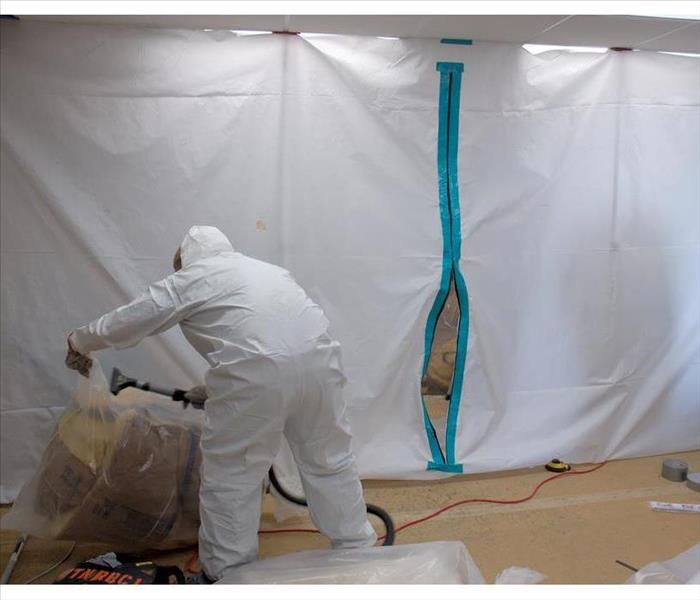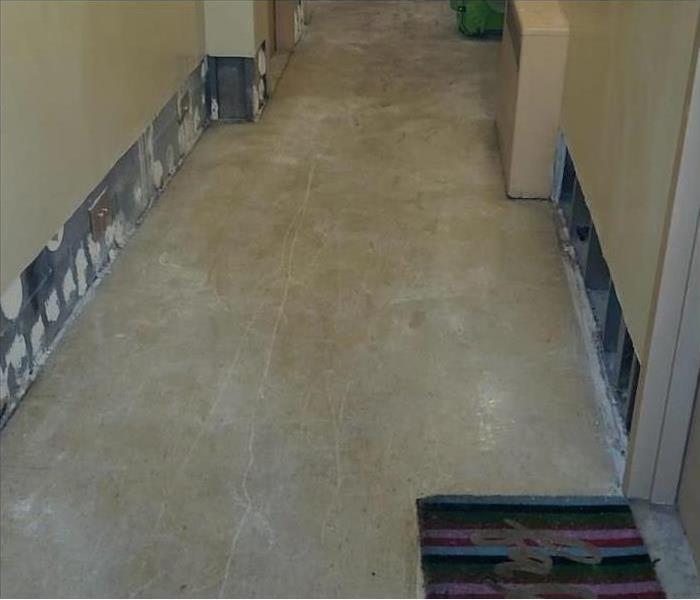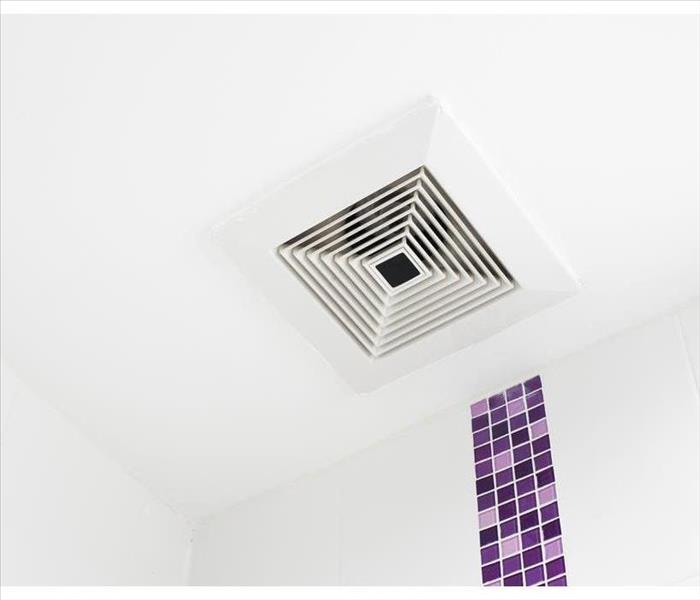Recent Why SERVPRO Posts
Is Your Water Heater Making Noises? 6 Common Causes
7/27/2023 (Permalink)
Your water heater is an essential appliance that provides hot water for various household activities. However, if you've noticed strange noises coming from your water heater, it can be concerning and may indicate an underlying issue. In this blog post, we'll explore common reasons why your water heater might be making noises and discuss potential solutions to address the problem.
Sediment Buildup
One of the primary culprits behind noisy water heaters is sediment buildup. Over time, minerals and debris can accumulate at the bottom of the tank, causing popping or rumbling sounds during heating cycles. This happens when the sediment comes into contact with the heating element or burner. Regular flushing of your water heater can help prevent sediment buildup and reduce the noise caused by it.
Consider performing routine maintenance by flushing your water heater to remove sediment. Follow the manufacturer's instructions or consult a professional plumber to ensure proper and safe execution.
Expansion and Contraction
As the water inside the tank heats up, it expands, leading to pressure buildup. This expansion can result in popping or cracking noises. Similarly, when the water cools down, the tank and its components contract, which can also generate audible sounds. These expansion and contraction noises are usually harmless but can be alarming if you're not familiar with them.
There's no specific solution required for expansion and contraction noises as they are a natural occurrence. However, if the sounds persist or are accompanied by other issues, it's advisable to have a professional inspect your water heater.
Loose Heating Elements or Components
Over time, the heating elements or other components within the water heater can become loose due to thermal expansion and contraction or regular use. Loose elements or parts may vibrate, causing rattling or humming noises during operation.
If you suspect loose components, it's best to have a professional plumber inspect the water heater. They can tighten or replace any loose parts to eliminate the noise and ensure the proper functioning of the unit.
Mineral Deposits on Heating Elements
In areas with hard water, mineral deposits can form on the heating elements inside the water heater. When the water heats up, these deposits can cause a sizzling or hissing sound as they burn off or react with the heat.
Flushing the water heater and periodically descaling the heating elements can help remove mineral deposits. If the deposits are severe or persistent, it's recommended to consult a professional plumber for proper cleaning and maintenance.
Pressure Relief Valve Issues
The pressure relief valve is a safety feature of the water heater that releases excess pressure to prevent tank rupture. If the valve is faulty or defective, it may cause hissing or leaking noises. A malfunctioning pressure relief valve should be addressed promptly to ensure the safe operation of your water heater.
If you suspect a problem with the pressure relief valve, it's essential to have a professional plumber inspect and replace it if necessary. It's crucial not to attempt to repair or replace the valve yourself, as it requires specialized knowledge and skills.
Aging or Failing Water Heater
In some cases, unusual noises from your water heater may indicate that it is aging or nearing the end of its lifespan. Components may wear out, and the tank itself can become weakened, leading to increased noise during operation.
If your water heater is old or exhibiting multiple issues, it may be time to consider replacing it. Consult a professional plumber to assess the condition of your water heater and provide recommendations for a suitable replacement unit.
Unusual noises coming from your water heater can be a cause for concern, but they often have straightforward explanations and solutions. By understanding the common causes of water heater noises, such as sediment buildup, expansion/contraction, loose components, mineral deposits, pressure relief valve issues, or an aging unit, you can take appropriate steps to address the problem. Regular maintenance, professional inspections, and timely repairs or replacements will ensure a reliable and efficient water heater that operates quietly, providing hot water when you need it.
5 Reasons You Might Have Mold
7/29/2022 (Permalink)
 Black mold beside bedroom wall in New Hyde Park, NY.
Black mold beside bedroom wall in New Hyde Park, NY.
Don't Let Black Mold Invade Your Home
Mold is a persistent organism that can grow just about anywhere in your New Hyde Park, NY, home. Black mold is much more likely to appear in areas that come into frequent contact with water, or places that have just suffered some form of water damage. If you're unsure what exactly is causing your mold problem, you might want to look into the following possible causes.
1. Your Home's Humidity Is too High.
Higher humidity levels can lead to a buildup of condensation, that eventually causes mold growth. This additional moisture in the air can become trapped in your carpeting, walls, ceilings and other locations. You can prevent this issue by ventilating your home properly or investing in a dehumidifier.
2. You Left Damp Items Inside.
Chances are, you've forgotten to hang up a load of laundry after washing at least once or twice. While this is an easy mistake, it can have potentially disastrous consequences. Black mold only needs about 24 hours to begin growing, meaning that the pile of damp clothes you left out for a day or two could be the root of your issue.
3. Your Roof Is Leaking.
Smaller leaks are easily overlooked, but that doesn't mean that they can't wreck havoc on your home. The water that seeps in through the leak can become trapped in your ceiling or attic, eventually resulting in a moisture problem that causes unwanted mold growth.
4. You Recently Suffered a Home Flood.
Flooding, unfortunately, coincides with plenty of secondary damage. You might think that your problems are over after you clean up the water, but the mold issues have only just begun. It's a good idea to contact mold cleanup professionals, as well as flood remediation experts, whenever your home suffers extreme water damage.
5. You Have a Leaky Pipe.
Along with driving your water bill through the roof, a leaky pipe can cause disastrous amounts of mold damage. It doesn't take a ton of additional moisture to invite mold growth, so that persistent drip might be more dangerous than you think.
Don't let black mold invade your home. Contact mold remediation professionals immediately after you discover the problem.
What Is Mold Containment and Why Is It So Important?
7/24/2022 (Permalink)
 Mold containment in Bellerose, NY.
Mold containment in Bellerose, NY.
Running a business in Bellerose, NY, is a complicated dance of trying to eke out a profit while conforming to numerous local, state and federal laws. According to OSHA, “employers are responsible for providing a safe and healthful workplace for their employees.” This includes any mold removal necessary to keep the indoor mold count at an acceptable level.What Is Black Mold?
Molds are a type of fungus and are a critical part of the natural decay process. Most types of fungus are happiest outside, growing on their preferred food source and breaking it down into constituent nutrients.
Black mold is different. It prefers to grow inside, especially in human-built structures. Actually, black mold may be any of three colors:
It’s typically shiny, and it loves to grow on porous materials with a lot of cellulose in them. Wood and drywall are perhaps its two favorite foods.
Why Does It Need to Be Removed?
Mold removal is never about completely eliminating mold spores from the air. Outside of specialized and expensive lab equipment, nothing’s going to completely purify air – even inside.
However, once a colony of mold gets established inside, it eats away at the material it sits on, reproducing itself and potentially spreading throughout a building. Amongst other issues, it can destroy building materials and leave unsightly stains.
What Is Containment?
Explosive mold growth happens when it has a favorable surface and excessive humidity. When a qualified mold remediation company discovers it growing in your business, they’ll immediately contain the area to prevent further spread.
This is typically done using a few professional tricks, including
- Custom air movers
- Physical barriers
- Negative air pressure
Also, they’ll turn off your heating and air conditioning system to further obstruct airflow. Next, they’ll locate all the hidden colonies and destroy them using unique sanitizers that also help prevent future growth.
Once the mold removal is done, they can locate the cause of excess humidity and begin the restoration process. This is designed to leave your business looking just like it did before you had mold.
Act Fast To Avoid More Damage After a Storm
5/27/2022 (Permalink)
 Commercial storm damage in New Hyde Park, NY
Commercial storm damage in New Hyde Park, NY
After a Storm, Act Quickly To Avoid More Damage
Severe storms are known to wreak havoc in New Hyde Park, NY. After the storm passes, contacting your flood insurance provider is a must. Unfortunately, many others have also likely sustained flood damage, which means you are left waiting. During that time, other damage may start to form.
Mold Damage and Other Issues
Whenever this unwanted water, the chances rise that there will also be mold. If spores have the right conditions, they may start their growth process within 24 hours. Since that damage wasn’t directly related to the storm, flood insurance likely won’t repair flood costs. Other common forms of secondary damage include:
Corrosion: Any metals left in standing water may start to rust or corrode. This may mean degraded pipes and studs, which are costly repairs.
Electrical: Depending on the height of the water in the home, electrical outlets may be affected, which increases the risk of a fire.
Wood Rot: Wood is porous and absorbs water. Any flooring or material components made of wood may be at risk.
Act Fast
While it’s important to follow your insurance provider’s directions, which may include not removing anything from the property, the instructions will likely include calling a professional mold and water damage restoration company to help prevent secondary damage. This often includes beginning the water extraction process, which is essential to stopping mold from growing. Tarping or boarding up exposed areas of the home is also necessary. Although the storm may be over, another one could be lurking. Broken windows or missing doors are also easy targets for vandals. Ensuring that any additional water or other risk factors are reduced helps make the restoration process easier.
When bad weather hits, you are likely not the only person calling your flood insurance provider to make a claim. Acting fast and taking prevention methods to avoid additional damage are necessary to maximize your claim and minimize the restoration period.
3 Ways To Prevent Bathroom Mold
2/22/2022 (Permalink)
 Continue running the fan after your shower for at least the length of time that your shower lasted
Continue running the fan after your shower for at least the length of time that your shower lasted
Ways To Prevent Mold Growth In Your Bathroom
Water damage isn't always a prerequisite for mold growth. The threat of mold also looms large over your bathroom thanks to its frequently wet and humid conditions. Here are three steps you can take to prevent mold from taking root in your bathroom.
1. Keep the Fan Running
You probably know that you should run the fan during a shower to disperse the humid air. What you may not know is that you should continue running the fan after your shower for at least the length of time that your shower lasted. In other words, if you take a luxurious 15-minute shower, you should run the fan for at least another 15 minutes after you're done deep conditioning your hair and singing Black Sabbath's greatest hits at the top of your lungs.
It's important to make sure your fan works, too. If it's clogged with dust and debris, it can't remove the moisture from your bathroom adequately. Similarly, if it's not powerful enough for the room, it's likely time to invest in a larger fan.
2. Make Repairs Promptly
If you spot a leak in your bathroom, you might be tempted to ignore it. What's a little more water in a room that's devoted to H20, right?
The problem is, letting even small repairs go unchecked can quickly lead to much larger and more extensive water damage issues, including mold growth. Mold is an opportunist; if you give it an inch, it'll take a vanity cabinet.
3. Do Your Laundry
At least once a week, you should wash not only your bath towels and washcloths but also your bathmat and any bathroom rugs. They're porous, they're frequently wet, and if you don't launder them regularly, they can turn into plush mold motels.
If you suspect you have mold growth, enlist the help of an experienced mold remediation team promptly.



 24/7 Emergency Service
24/7 Emergency Service



